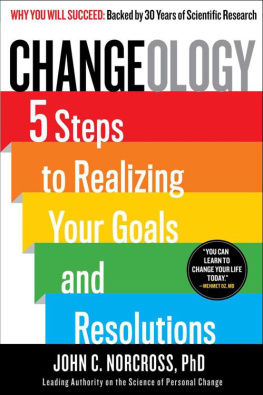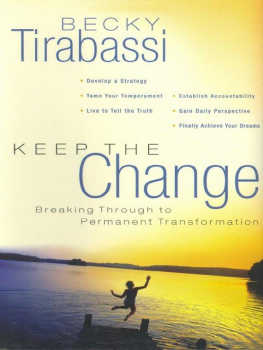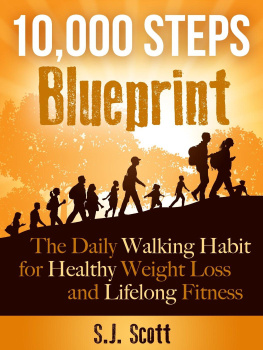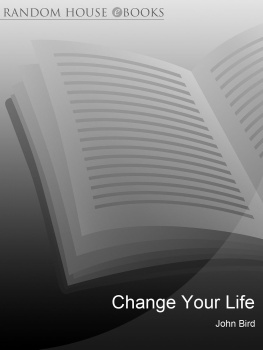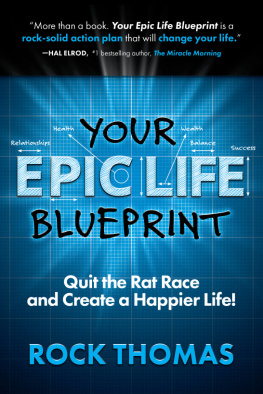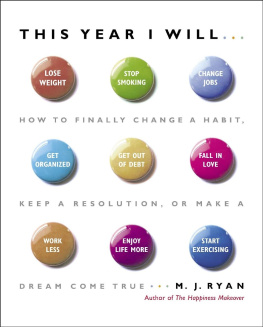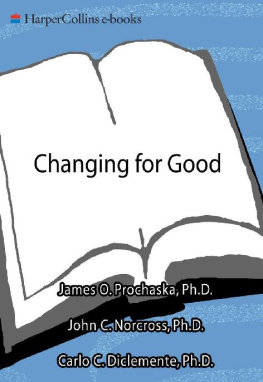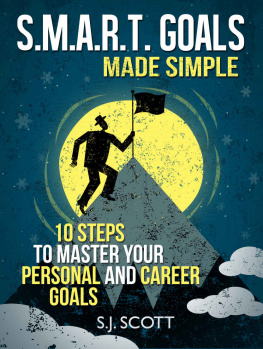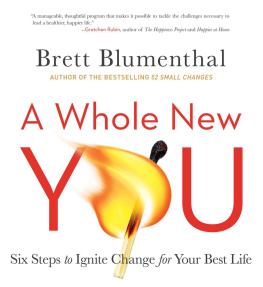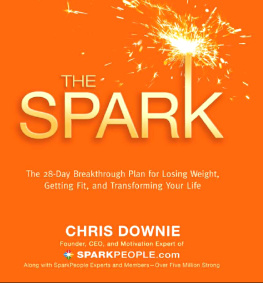
Thank you for purchasing this Simon & Schuster eBook.
Join our mailing list and get updates on new releases, deals, bonus content and other great books from Simon & Schuster. C LICK H ERE T O S IGN U P or visit us online to sign up at
eBookNews.SimonandSchuster.com

CONTENTS
To my brothersGeorge, Donald, and Philip
who have changed me in so many ways
INTRODUCTION
CHANGEOLOGY: WHAT IT IS AND
WHAT IT CAN DO FOR YOU
Lets begin with the end in mind: think of one, maybe two, things that youd like to change in yourself, something you really want to modify about your behavior. If youre like most people, it doesnt take long to come up with something. Perhaps a laundry list of goals and ambitions rushes through your mind, some harder to achieve than others. Maybe a quick smile breaks out on your face when you proudly recall a goal you have recently realized. Perhaps, too, you feel a brief pang of guilt for not trying to change certain things or a fleeting sense of dismay because your previous attempts have proven unsuccessful. All of these complicated feelings are part of the universal constellation of emotions toward change.
Now take a deep breath and consider the following: whether youre hoping to stop smoking or gambling, commit to exercising more hours a week (maybe run a marathon), eliminate fast food and bike to work, or learn a new skill that will earn you a promotion, following the scientific program outlined in this book can dramatically increase your chance of successwithout drugs or other types of formal treatment. This proven program shows you exactly how to execute the steps necessary to change on your own. And best of all: you can experience lasting results within 90 days.
Sound too good to be true? Much in the way Elisabeth Kbler-Ross distinguished stages of grief, my colleagues and I have identified five distinct stages of behavior change. This is hardly an inconsequential finding; these stages, which Ive simplified to just 5 straightforward steps, reflect three decades of scientific research and millions of dollars in funding. Finally, this well-documented program for successful change is accessible to everyone in this practical book.
From chronic addictions to minor habits, the range of behaviors that we can change is vast but the process of change is the same. In other words, the steps an overweight individual has to take to lose pounds permanently will be the same as those taken by a workaholic seeking to cut back on time spent in the office so he can spend more time with his family. Granted, as each person passes through the steps, he or she will have different goals, but the overall experience will be astonishingly similar.
How do I know this for sure? Thats what part of this book is going to reveal to you; Ill be detailing what Ive learned as a clinical psychologist and university professor helping tens of thousands of peoplein both research and clinical settingsachieve permanent changes.
A LITTLE HISTORY
I was there at the beginning. Not at the creation of the world, mind you, but at the start of defining one of the most effective and celebrated systems ever for changing human behavior: the Stages of Change. Before I detail exactly how youll create successful change in your life, let me take a few moments to introduce myself and provide the backstory. It will help you understand just how different Changeology is from any other program that you might have tried in the past.
It all started in 1980. Jimmy Carter was in the White House, and Dallas was flickering across the nations TV screens. I had just moved to Rhode Island to earn my doctorate and to work with Dr. James O. Prochaska on his first National Institutes of Health grant to study self-change how people modify their behavior without professional treatment. He and one of his recent graduates, Dr. Carlo C. DiClemente, were studying how a thousand people stopped smoking on their own. Little did any of us imagine that those early studies would lead to revolutionary advances in understanding how people change their behavior on their own.
Five years later, I had my clinical psychology PhD in hand and an internship at Brown University Medical School under my belt. I accepted a professorship at the University of Scranton, nestled in the rolling foothills of the Pocono Mountains in northeastern Pennsylvania. I continued my research into self-change and psychotherapy, much of it in collaboration with Jim Prochaska.
In the 1990s, the research got really interesting as research assistants and I conducted three nationally publicized studies that tracked New Years resolutions. We learned, scientifically speaking, what predicted some resolvers success and others failures. Our investigations also looked at change in psychotherapiststhe most educated and experienced change agents. How do the experts change themselves?
After the new millennium, my comrades and I conducted another series of studiesa dozen, in factto identify the effectiveness of myriad self-help resources. We separated the chaff from the wheat among thousands of self-help books, autobiographies, films, and websites. We managed to determine what kind of self-help resources work and what constitutes ineffective, unscientific pabulum.
Today, there is a staggering number of published studies that have been done on the stages of changemore than two thousand and counting. Our work has added to this undeniably impressive body of research, which has enjoyed the support of $80 million in federal grant funding. Although the early studies concentrated on addictions, such as smoking, drinking, and overeating, over the years they have expanded to include three dozen challenges that millions of people face in daily living, including distressed relationships, anxiety, getting ahead at work, troubling finances, depression, and procrastination.
The program resulting from this research works across a variety of problems, across countries and cultures, and across the spectrum of healing. Its been used successfully by individuals, couples, families, organizations, and entire health systems worldwide. Whats more, its been proven to work whether youre attempting to change on your own or are armed with a self-help book, assisted by a formal support group, treated by a psychologist, bolstered by medication, or any combination thereof.
Our change system has a documented track record of success. It has guided tens of thousands of research participants and psychotherapy patients to lives filled with greater health and happiness. That same research can now guide you through the labyrinth of self-change to your goal. This revolutionary system has been translated into the step-by-step program explained in this book. In other words, you can reap the same benefits of our research that our patients have experiencedjust by reading and following the advice offered in Changeology.
HOW CHANGEOLOGY DIFFERS FROM OTHER SELF-HELP
At this point youre probably thinking, Hes making awfully strong claims! Or perhaps youre silently protesting, The usual oversold promises of self-help books. Correct on both counts: These are strong claims, and most self-help books do guarantee unrealistic and unproven results. Decades of research validate the methods described in this book: thats the crucial difference between Changeology and the morass of other self-help books. I deplore the insulting, antiscientific fare of most self-help books. In fact, thats been a huge motivator for my career as a clinical psychologist, university professor, and researcher focused on studying behavior change. I have devoted decades of my life to determining what works and what doesnt.
Next page
